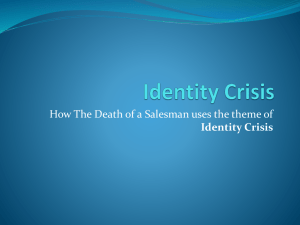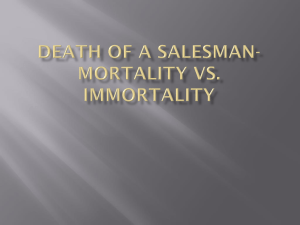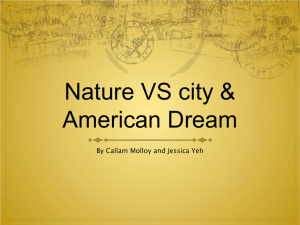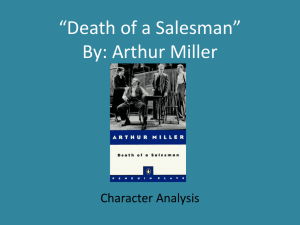THE DEATH OF A SALESMAN
advertisement
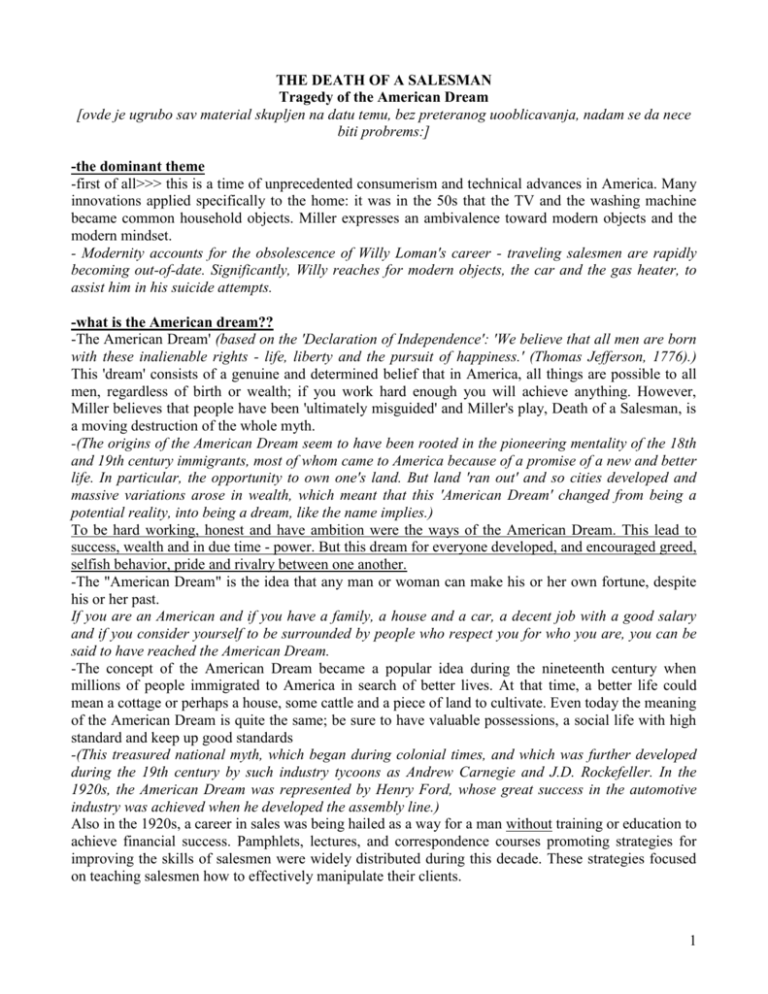
THE DEATH OF A SALESMAN Tragedy of the American Dream [ovde je ugrubo sav material skupljen na datu temu, bez preteranog uooblicavanja, nadam se da nece biti probrems:] -the dominant theme -first of all>>> this is a time of unprecedented consumerism and technical advances in America. Many innovations applied specifically to the home: it was in the 50s that the TV and the washing machine became common household objects. Miller expresses an ambivalence toward modern objects and the modern mindset. - Modernity accounts for the obsolescence of Willy Loman's career - traveling salesmen are rapidly becoming out-of-date. Significantly, Willy reaches for modern objects, the car and the gas heater, to assist him in his suicide attempts. -what is the American dream?? -The American Dream' (based on the 'Declaration of Independence': 'We believe that all men are born with these inalienable rights - life, liberty and the pursuit of happiness.' (Thomas Jefferson, 1776).) This 'dream' consists of a genuine and determined belief that in America, all things are possible to all men, regardless of birth or wealth; if you work hard enough you will achieve anything. However, Miller believes that people have been 'ultimately misguided' and Miller's play, Death of a Salesman, is a moving destruction of the whole myth. -(The origins of the American Dream seem to have been rooted in the pioneering mentality of the 18th and 19th century immigrants, most of whom came to America because of a promise of a new and better life. In particular, the opportunity to own one's land. But land 'ran out' and so cities developed and massive variations arose in wealth, which meant that this 'American Dream' changed from being a potential reality, into being a dream, like the name implies.) To be hard working, honest and have ambition were the ways of the American Dream. This lead to success, wealth and in due time - power. But this dream for everyone developed, and encouraged greed, selfish behavior, pride and rivalry between one another. -The "American Dream" is the idea that any man or woman can make his or her own fortune, despite his or her past. If you are an American and if you have a family, a house and a car, a decent job with a good salary and if you consider yourself to be surrounded by people who respect you for who you are, you can be said to have reached the American Dream. -The concept of the American Dream became a popular idea during the nineteenth century when millions of people immigrated to America in search of better lives. At that time, a better life could mean a cottage or perhaps a house, some cattle and a piece of land to cultivate. Even today the meaning of the American Dream is quite the same; be sure to have valuable possessions, a social life with high standard and keep up good standards -(This treasured national myth, which began during colonial times, and which was further developed during the 19th century by such industry tycoons as Andrew Carnegie and J.D. Rockefeller. In the 1920s, the American Dream was represented by Henry Ford, whose great success in the automotive industry was achieved when he developed the assembly line.) Also in the 1920s, a career in sales was being hailed as a way for a man without training or education to achieve financial success. Pamphlets, lectures, and correspondence courses promoting strategies for improving the skills of salesmen were widely distributed during this decade. These strategies focused on teaching salesmen how to effectively manipulate their clients. 1 -Willy Loman is the primary target of this dream - the first character to represent the search of the American Dream. - as mentioned, in 1920s there was a belief that salesmen adept at manipulation and “people skills” were destined for wealth and fame was widespread. However, by the late 1940s, when Death of a Salesman takes place, the job market and prevailing belief has changed, and salesmen (and other workers) required specialized knowledge and training in order to succeed. Because he lacks such knowledge or training, Willy is destined to fail in a business world that demands the ability to play a specific part in a large establishment. Willy, of course, does not realize how things have changed, and he continues to try to strike it rich using his powers of persuasion. Willy’s personal representations of the American Dream are his brother Ben and the salesman Dave Singleman, and he views the success of these two men as proof that he can indeed attain the success he is so desperate to achieve. (later) - so, Miller chose the job of salesman carefully for his American Dreamer, because a salesman does not make his own product, has not mastered a particular skill or a body of knowledge, and works on the empty substance of dreams and promises. Additionally, a salesman must sell his personality as much as his product. - Willy is like most middle-class working men, he struggles to provide financial security for his family and dreams about making himself a huge financial success. But, after years of working as a traveling salesman, Willy Loman has only an old car, an empty house, and a defeated spirit. - Willy Loman falsely believes he needs nothing more than to be well liked to make it big. His view of the American dream is that of the “self-made man” who rises out of poverty and becomes rich and famous and he believes wholeheartedly in what he considers the promise of that Dream—that a “well liked” and “personally attractive” man in business will indubitably and deservedly acquire the material comforts offered by modern American life. - First of all, Willy has a strong belief of the American Dream because of his brother Ben. "Why boys, when I was seventeen I walked into the jungle, and when I was twenty-one I walked out. And by God I was rich." This quote by Ben is the bases of Willy’s beliefs for his family and himself. - By this understanding, Willy thinks he will never need to search for anything; it would come to him. - Willy instills this same belief within his sons. "Listen to this. This is your Uncle Ben, a great man! Tell my boys, Ben!" When Willy states this to Ben he wants his boys to have the same thought on life as himself. Though, like their father, the two sons are led to the idea that greatness will come to them. - he wants to be a mirror image of his brother Ben. Willy believes that Ben has the "ultimate life", and strives to follow in the dream of being a successful salesman - "The jungle is dark but full of diamonds." The jungle metaphor is continually bought to the reader's attention throughout the novel. Like Ben, Willy hopes to strike it rich in the business world of New England. Yet Willy never finds the diamonds (success), and he leaves life without fortune or fame. In many ways, the jungle also represents the American Dream ideal that Miller often criticized. It is the opinion of Willy that the job of a salesman is the most enjoyable of all jobs. - Willy has many illusions which are evident to us. For example>"...And the smile on your face" gives the reader the notion that Willy is happy in his job, which Willy himself leads himself to believe. - Also, when explaining why they can't leave the crowded city to live in New York, Willy tells his wife, "I'm the New England man. I'm vital in New England." Unfortunately for Willy, this 2 - - only turns out to be another illusion that he has created for himself. Like his brother Ben who conquered the wilderness, Willy feels that he must live on the frontier, building a house and planting a garden for his family if he wants to properly care for them. He tells Linda, "Before it's all over we're gonna get a little place out in the country, and I'll raise some vegetables, a couple of chickens..." Unfortunately, times have changed and his dream is no longer possible. In essence, the illusions that Willy experiences come directly from him having the "wrong dreams" and ideas about life. (Miller stressed his success and material reward in Ben. He does this by Ben repeating himself a lot, ' I walked into the jungle, and when I came out I was rich.' But Ben also has emptiness in spite of his success.) In the eyes of the audience, he has no real happiness. Will has been a failure in life. But he feels even more so because of the fact that success in the American Dream is supposed to be available to anyone. This figure has significantly effected his family - especially his sons. Biff is just as hopeless as Willy in a lot of ways. - His idealism is sustained by an anecdote about a salesman named Dave Singleman Dave Singleman>> Willy experienced the pain of knowing he cannot and wont be able to become Dave Singleman. This man maybe maid up in Willy's head. But this man is a huge icon for Willy to look up to. - Dave was greatly valued, whereas Willy isn't, nor is he loved as much. I think that this marks Willy's failure as a businessman. He hasn't realised the demands of the business world. Howard isn't interested in the story of Dave. To have a successful business, it has to be efficient, sometimes having to be ruthless. Willy said, ' There was respect, and comradeship, and gratitude in it. Today, it's all cut and dried, and there's no chance for bringing friendship to bear - or personality.' - Funeral - - Willy believes that life’s problems can be solved by looking “Well-liked”. But he does not realizes the fact that the age in which he is living, the good looks does not matter, what matters is the wealth you have. By wealth you can buy anything. All relations are useless before almighty dollar. He receives his severest blows when he needs the greatest amount of love and care. He is unable to travel extensive. He makes a request to his young employer to relieve him of such a tiring burden and give him a comfortable job. But, for the capitalism businessman no moral or legal obligation can be biding. To him, Willy is commercially as useless as the peels of a fruit. So, he says: I can’t take blood from a stone. - The play is really a challenge to the American Dream because it is the tragedy of a man troubled by the society. Willy believes in American myth that “Success is obtained by being well-liked”. His dream ends up in nightmare. So the play challenges to new American capitalistic concepts.( American dream means the dream of becoming rich overnight. The scale and merit of success is money, big house, a costly car and other material things. Nobility, truth, honesty are not merits. Values have been changed through this dream. Instead of hard work and courage, there is salesmanship. It implies fraud, the ability to sell a commodity regardless of its intrinsic uselessness. The goal of salesmanship is to earn a profit.) - The only reality, the only goal is that of material success. - His fall, his death reflects the total break down of the concept of salesmanship, an integral part of America setup - We see his blindness in following the American dream again. The dream is his goal. This goal is clearly outlined by dollar signs and a sense of ownership, two key points to personal success. - believed wholeheartedly in this treasured national myth, - Willy does not ever understand his search until the end of the play. "What-what’s the secret?" Willy asks Bernard this question which shows he is still searching for the key to the American 3 - - Dream. At the end of the play, Willy believes that the only answer to the success of his family is through his death. Willy’s blind faith in his stunted version of the American Dream leads to his rapid psychological decline when he is unable to accept the disparity between the Dream and his own life later, Willy Loman is beginning to notice where all of this dreaming has led him In the climax of the play, when Willy realizes that he is loved by his sons, a slight awakening occurs in Willy's mind. Biff has never been able to follow his dream because of his father pushing him into the false dream of being a businessman. Willy comprehends that he has been denying his son of the dream that he wishes to achieve, and out of pure love kills himself, giving his life insurance to his family, and completes the dream of being wealthy, hoping that by completing the false dream will free his sons of the burden to finish it for him, allowing them to create their own dreams, and then follow them with the money that Willy leaves behind. -Linda Loman -the next character to represent her search for the American Dream. -At first, Linda’s search is for good family relationships. After the big plans are made for the sporting goods shop, Linda’s spirits seem very high. Everyone in her family is getting along, therefore she is happy. These little perks of happiness are enough to keep her dream alive. Then, Linda has a more true view on her family’s search. Comments like, "Your such a boy," and, "One a philandering bum," are insights on what Linda sees within her sons. Knowing her boy’s potential is no longer existent, is what makes her far different than her husband. At last, Linda represents the realistic side of the family. As Linda is speaking of the last mortgage payment she states, "It’s an accomplishment." She has given a clue that little accomplishes such, as these are enough to fulfill the dreams in her life. She has no high aspirations for being rich nor does she have it all. Linda is the one character that is content in what her family can or cannot accomplish. The key thing which leads to Willy and Linda's depressions, is their inability to face reality in the present. -The Loman boys are the final representatives of the American Dream. - First, the two men represent the failure in the search of the American Dream. When the two sons make statements like, "I’m thirty-four years old, I oughta be makin’ my future," and, "Pop, I’m nothing!" They know they have not accomplished the factor of being successful. The two do not have a clue on hardwork of how to reach above their parents. -When their father puts down such people as Bernard it is no question of why the two are mislead from success. -In addition, Happy Loman believes that the key to the American Dream is through his father. As a boy Happy of would impress his father with statements like, "I lost weight, Pop, you notice?" These types of words didn’t end with his childhood even an adult he would say, "I’m getting married, Pop, don’t forget it. I’m changing everything." These types of statements are clues that Happy only found happiness in pleasing his father. However, Buff Loman takes his own thoughts about the American Dream to a different level. His dream is surfaced around, "Working out in the open," as he states to his brother. Without any rules or barriers Buff wants to accomplish this aspect of his American Dream. - Happy, who had previously given the appearance of being more well-grounded in reality but still hoping for something better, completely falls into his father’s thought pattern, pledging to achieve the dream that his father failed to achieve - neither Biff nor Happy ends up leading an ideal, godlike life; while Happy does believe in the American Dream, it seems likely that he will end up no better off than the decidedly ungodlike Willy. 4 The stories they were told made them picture their father as a popular, successful, well-known salesman. As Biff grew up, he found himself being told things about his father like "A salesman has to dream, it comes with the territory At the plays conclusion, Biff is susceptible to succumb to the fact that his father, Willy, did in fact have "all the wrong dreams", and the reader will agree that this is ultimately what lead to Willy's downfall. Tied up intimately with the idea of the American dream is the concept of opportunity. America claims to be the land of opportunity, of social mobility. Even the poorest man should be able to move upward in life through his own hard work. Miller complicates this idea of opportunity by linking it to time, and illustrating that new opportunity does not occur over and over again. Bernard has made the most of his opportunities; by studying hard in school, he has risen through the ranks of his profession and is now preparing to argue a case in front of the Supreme Court. Biff, on the other hand, while technically given the same opportunities as Bernard, has ruined his prospects by a decision that he made at the age of eighteen. There seems to be no going back for Biff, after he made the fatal decision not to finish high school. CONCLUSION In Death of a Salesman by Arthur Miller, Willy Loman's determination to live up to his "American Dream" and to seek material happiness only takes his life. defeat illustrate not only the failure of a man but also the failure of a door-to-door salesman."dreams" and reality. In some very poignant and direct criticism, Arthur Miller provides a vivid picture of exactly what constitutes the personality and psychological make-up of Willy Loman. He says that Willy "cannot bear reality, and since he can't do much to change it, he keeps changing his ideas of it. Miller's ability to project this story of his class hero into the common experience of so many Americans who sustain themselves and their families with ignorance and unrealistic goals The Loman family represents all of the searches for the American Dream in each of their own ways. Even after the loss of Willy, Linda, Happy, Buff, nor Willy himself capture their dreams. Throughout the play the families’ failure is exemplified by the success of Charley and his family. The family almost seemed destined to end up the looser. As their name entails they will be nothing short of a low man. - Unfortunately for Willy, most of his dreams are illusions, yet he is unable to come face to face with this fact. Willy represents Every low-man in America. Hence, it is a tragedy of every American. Willy Loman destroys himself trying to achieve a dream, which is forced upon him by society. - In conclusion we can say that Miller in “Death of a Salesman” has tried to show the failure of American dream. Implicitly, he tells us that man is not a machine, he has emotions too. Thus placing all the values on riches is wrong. The whole situation he sums up in Biff’s remark who says on his father’s death. Maja 5

